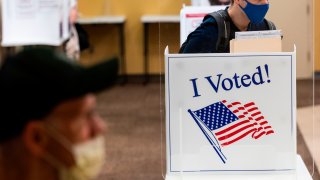
Money, and a lot of it, is pouring into campaigns for the two questions on the November ballot in Massachusetts.
A look at both referendums and the cash being spent around them:
RIGHT TO REPAIR
By far, most of the money has been raised by supporters and opponents of Question 1, which would expand the state’s “Right to Repair” law by giving car owners and independent auto repair shops expanded access to mechanical data related to vehicle maintenance and repair.
Collectively, the two groups have pulled in more than $41.5 million, according to reports filed with the state Office of Campaign and Political Finance.
Supporters of the question — the Massachusetts Right to Repair Committee — have raised about $15.7 million. Donors include auto parts suppliers and The Coalition for Auto Repair Equality, a non-profit national organization that represents companies like NAPA, AutoZone and Advance Auto Parts.
The Massachusetts Right to Repair Committee said voting “yes” on the question ensures car owners access to the repair information necessary to bring their cars to their local repair shop even as vehicles become more computerized, according to a statement included in a voter information guide produced by the Secretary of State’s office.
Local
In-depth news coverage of the Greater Boston Area.
That group said the question “provides access only to mechanical and repair information, not personal information.”
A much larger chunk of cash — about $25.8 million — has been pulled in by those trying to defeat the measure.
Nearly all the money raised by the Coalition for Safe and Secure Data has come from carmakers including General Motors, Ford Motor Co., Toyota Motor North America, Nissan North America, America Honda Motor Company, Hyundai USA and Subaru of America.
The question has nothing to do with fixing cars, but is instead “a data grab by third parties who want to gather your personal vehicle information and access it remotely, including location data in real time,” according to a statement from the coalition included in the voter guide.
All that money has allowed both sides to flood the state with television ads.
One ad warns that if Question 1 passes, a car’s data could be used by predators to stalk their victims by pinpointing their location. In another commercial, car owners are told that without the proposed changes to the law, automakers could gain a monopoly on repairs while killing off small repair shops.
Starting with model year 2022, the proposed law would require manufacturers of motor vehicles sold in Massachusetts to equip any vehicles that use telematics systems — those that collect and wirelessly transmit mechanical data to a remote server — with a standardized open access data platform.
RANKED CHOICE VOTING
Money has also been flooding in for a second ballot question heading to voters, although virtually all the cash has been raised by one side: the supporters of Question 2.
The referendum would create a ranked choice voting system, giving voters the option of ranking candidates on the ballot in order of their preference — one for their top choice, two for their second choice, and so on.
If a candidate gets a majority of first-place votes, that candidate wins. If no candidate receives a majority of the first-choice votes, the candidate with the fewest votes is eliminated. Voters who ranked the eliminated candidate as their first choice will have their votes counted instead for their second choice.
The process repeats until one candidate receives a majority of the vote and wins. The new system would apply to state and federal elections and primaries in Massachusetts beginning in 2022. It would not be used in presidential elections.
Backers of ranked choice voting — including the Ranked Choice Voting 2020 Committee — say the goal is to eliminate the so-called “spoiler effect” by making sure no candidate wins without a majority of votes. They’ve collected $5.6 million, including thousands of small dollar donations.
The question has some bipartisan support — both former Democratic Gov. Deval Patrick and former Republican Gov. William Weld back the change — but some more conservative voices in the state oppose the measure.
Ranked choice voting will be used for the first time in a presidential race in the U.S. in Maine after the state’s Supreme Court concluded a GOP-led petition drive intended to prevent its use failed to reach a signature threshold.
The question is also being supported by some deep-pocketed backers. A little more than half of the total contributions — about $2.9 million — has come from the Houston, Texas-based non-profit Action Now Initiative — a project of Texas philanthropist couple John and Laura Arnold.
Others who gave hefty sums include Kathryn Murdoch, wife of James Murdoch, the younger son of Rupert Murdoch ($500,000); Jonathan Soros, son of billionaire George Soros (100,000); Katherine Gehl, president of Wisconsin-based Gehl Foods ($250,000); and Maximillian Stone, managing director of the New York-based investment management first D.E. Shaw & Co. ($250,000).
Supporters like the group Voter Choice for Massachusetts said voters can cast a ballot for a single candidate if they want or rank their choices, ensuring “the winner has majority support and reflects the true will of the people.”
Opponents to the question — No Ranked Choice Voting Committee 2020 — reported raising just $250.
Critics led by the conservative Massachusetts Fiscal Alliance argue that ranked choice voting is confusing and will “force voters to guess the candidates who will remain standing in multiple voting rounds and cast their votes in the dark.”



